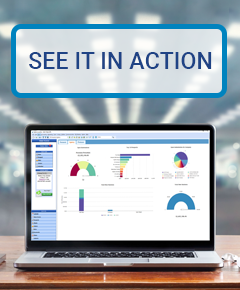
Marketing, Sales
Your insurance agency’s marketing goal is to stand out among the noise. Identifying and investing in serving a niche market is one of the most efficient and effective ways to achieve this challenging goal.
When you serve a niche market, you have less competition, making it easier to gain new customers in a specific arena. Your agency is set apart as providing “X” type of insurance, making you distinctive. PIA National’s 2022 Independent Agent Survey found that respondents devoted more than 20% of their book of business to a niche market. You, too, can capitalize on this valuable strategy.
Identifying Your Niche
The first step in capitalizing on a niche market is deciding where to focus. There are a few factors to consider when selecting a niche market, such as market saturation, agency expertise, and interests. It’s best to find a niche that has a low market saturation, is an area your agency has some knowledge about, and one that is particularly interesting to you or members of your team. With these elements combined, you are more likely to break into this niche area successfully.
One of the ways you can find your niche is by looking at your agency data. See if there is a specific area where you see a coverage gap or a pattern in your longest-standing customers. You can also talk with your team and see what problems they find interesting. From there, do research to identify the need for this particular niche in the markets you serve and gain some baseline understanding of what this particular area needs in terms of coverage.
Capitalizing on Your Niche
Once you know your target area, start gathering as much data as possible. Use your internal analytics to see who among your customers may have interest, and leverage marketing automation to serve them information about your new coverage. This data will also help you see how you can grow this niche area by identifying common coverage among this segment.
You’ll also need to grow your expertise in this specific niche area. While you should already have a baseline, you need significant depth to establish yourself as the go-to agency. Invest time in learning more about your niche market. Attend conferences and get involved in industry groups to get on-the-ground intel about what individuals or businesses in your niche want and need. Get endorsements from your current niche customers. The more you can show off your expertise, the better.
Marketing Your Niche
Your next step is to market your niche to customers and prospects. The only way you can capitalize on your target area is to let people know you’re an expert in that specific arena. Start by adjusting your SEO strategy, and adding keywords that pertain to your particular niche. Add those words to your website and, if possible, invest in online ads to pop up when individuals search for that niche within your coverage area.
Beyond SEO, you should also add a page about your niche on your website and, if you have a blog, add a category dedicated to it. Be intentional about producing content related to your niche and highlight it regularly on your social media. Another great marketing avenue is to provide informational sessions to local businesses or organizations that fit your niche profile. The goal is to get your name associated with your niche anywhere and everywhere.
Other Elements to Consider
A few other areas to consider when breaking into your niche are carrier coverage, staffing, and internal processes. Before diving into your niche, be sure you have at least one carrier that covers your determined area. Ideally, you should have three to five carriers available to offer some choice for customers.
You should also consider adjusting your team structure and internal processes to facilitate your niche coverage. Perhaps you have individuals who already have some expertise in the niche area you can move into new positions. Maybe you need to start looking for a new hire to manage your new specialty better. Consider the updates you need to make ahead of launching your new initiative.
Partnering with the Right Provider to Help You Find Your Niche
At Partner Platform, we’re constantly working on making it easier for our agencies to grow their reach. Our integrated data and analytics make it simple to gain the information you need to identify and capitalize on your niche. From there, our Marketing Automation Manager and Producer Results Manager CRM are designed to help our agencies get the word out and track engagement.
See how we’re working with our tech partners to stay on the cutting edge, keeping our Partner Platform agencies nimble and a step ahead of the rest. Fill out a contact form here or get in touch at [email protected] or 800.747.7005, Option 6 to find out more.

Marketing, Sales
A lot has changed over the past few years due to the
unexpected disruptions of the COVID-19 pandemic. All industries felt the impact,
and the insurance industry is no exception. One of the most notable disruptions
is the speed at which changes took place, especially around customer
expectations and marketing.
What Your Agency Needs to Know About Insurance Marketing
Changes in insurance agency marketing that were projected to solidify in 5 to 10 years ended up evolving rapidly in just two. Chances are you’ve already made some of these adjustments to keep up with immediate demand, but there are other more “behind the scenes” adjustments agencies are making that you should note.
1) Know how people find you
Do you know how clients are ending up at your agency?
Whether through referrals, phone calls, or other methods, you need to know and
understand how to capitalize on those areas.
One of the most prominent channels these days is online
searches. Surveys show that almost 70% of consumers run an online search
before reaching out to an agency. And, over 65% of insurance consumers did
not have a specific agency in mind when they started their search. Queries for
terms like “insurance near me” have grown by over 100% in the past two
years. Are you poised to show up in the results?
As a result of this uptick in online searches, Search Engine
Optimization (SEO) is extremely valuable. Pay attention to what’s on your
website, focusing on adding specific key search terms throughout your pages for
ideal optimization. Paid advertising on search engines like Google and Bing can
also boost your visibility but at a cost. Some of these ads cost more than $50
per click, putting them at the high end of search engine advertising.
How your website looks is also a factor. Over 50% of online searches for insurance take place on mobile devices. If your website isn’t optimized for mobile, you can quickly turn a potential customer away. And, Google includes mobile optimization as part of their algorithm, meaning you can be dinged if you have an incompatible site. Your site should be mobile optimized, easy to navigate and provide a clear way for interested visitors to get in touch.
2) Know how prospects make decisions
As an agency, you need to understand a potential buyer’s thinking when evaluating their insurance options. Price and types of insurance offered remain top of the list as decisive factors, but service quality is becoming more prominent.
To hit on potential customer needs, your agency should offer various ways for customers to get in touch with you. Offer online, text, phone, chat, and in-person options to fit varying consumer preferences. Self-service portals and mobile apps are becoming increasingly popular as a first contact source to get in touch and gather the information prospects need to decide.
Yet, surveys showed 78% of insurance customers called an agency after running a search, and 62% said talking with an insurance rep was the “most influential factor” in making their decision. This shows that your online presence matters, but your human service interactions matter, too.
When Your Service Makes a Difference
Specific turning points in the customer’s journey make a big
difference. What you do in those moments can either turn a prospect into a
customer or turn a prospect away. Some of those critical moments include:
1) Your response time and quality
The immediacy, accuracy, and
overall quality of your response to initial outreach make a big difference in
how customers and prospects perceive your agency. Surveys show most callers hang
up after waiting about 90 seconds for a response, so you need to ensure
you’re connecting with individuals quickly.
Systems like marketing automation
are extremely valuable here as they instantly send a response to individuals
who email, fill out a contact form, or connect via chat, among other contact
methods. To add quality to your responses, connect your marketing automation
with your insurance
CRM to automatically create follow-up tasks so you can connect on a
personal level.
2) Your level of personalization
Along with the rise in demand for
immediate, digital service, customers are also asking for more
personalization and human connection. Almost 90% of insurance customers
surveyed said they demand more personalization from their providers. And, 84%
of marketers said phone calls have higher conversion rates than other
outreach methods. The personal connection found in a phone call still matters.
You can create opportunities for
personalization via digital connections, too. Marketing
automation is designed to make emails, social media connections, and other
forms of digital outreach as targeted to each individual recipient as possible.
The takeaway here is that your agency needs to offer multiple avenues for
connection to meet the varying needs of your growing customer base.
Who Can Help Your Agency Stay Nimble
Our Partner Platform team and agency community are committed to understanding growing insurance marketing and service trends. We provide regular webinars, in-person trainings, and an annual user conference as just a few ways to connect and discuss changes in the market.
Plus, our partners in the insurance tech industry help our community stay up-to-date on the latest technology, keeping our Partner Platform agencies well equipped.
Find out more about our Partner Platform community and how to get connected: contact us at [email protected] or 800.747.7005, Option 6.
Source: https://www.invoca.com/blog/insurance-marketing-statistics

Marketing, Sales
Social media marketing is nothing new in the larger
marketing industry but may be novel for independent insurance agencies. This
tool is something all agencies should include in their insurance agency
marketing strategy for several reasons. Social media can help your agency show
off your expertise, build trust with customers and prospects, and help you
better engage your customer base. For independent agencies, social media is an
excellent tool to amplify their valuable local and personal connections with
their communities.
Whether your agency is on social media or not, you’re being discussed in the social media space. Join in that conversation! Get your agency started by following a few simple dos and don’ts in the social media sphere.
Social Media “Dos”
To start, here are a few “must-dos” for
your insurance agency’s social media marketing.
- Get someone who knows what they’re doing or willing to learn. Don’t put your office manager on social media duty if they have no knowledge or interest in the job. Consider social media savvy in your hiring process, finding someone who has a knack for this unique role.
- Understand what your customers want to see in your social profiles. You can start by looking at other agencies or local businesses to see what content gets the most engagement. Then, ask your customers what topics interest them and go from there.
- Define your agency’s brand and tone for
all your social platforms. Think about your niche offerings and highlight them in your social media branding. And, pay attention to your tone, keeping it consistent across posts and platforms.
- Prepare all your staff for social media. Regardless of whether they’re doing the posting, everyone on your team needs to understand proper social media etiquette, including what’s appropriate to post and what they should avoid.
- Create a calendar to help plan your posts ahead
of time. Start by planning to have one post a week and expand to three to four times or more as your audience grows and time allows.
- Make opportunities for people to engage with
your content. Ask questions, request photos, or hold contests to get people to comment, like, and share your content with others.
- Track what’s working, keeping a record of what posts are getting the most clicks and shares. You
can use this data to craft better posts for the future.
Social Media “Don’ts”
There are also some common mistakes to avoid when
getting your agency on social media
- Signing up for every platform without researching
which works best for your needs. It’s best to start with one or two platforms
and expand from there.
- Posting a lot one day and then taking a
break. When you post three times in a row then don’t have anything for a
few days, your audience gets confused. Set up a regular cadence for posting and
avoid posting more than once a day.
- Using different account names and pictures for
each platform. Strive for consistency, using the same profile icon for each
platform and a similar name. It may not be possible to have the same name on
each account, but you should try for similar names like “YourLocalAgency”
on one and “Your_Local_Agency” on another.
- Leaving your profile bare. Add as much
relevant information as possible to your account profiles, especially your
agency name, website, and phone number. The more you can put in your profiles,
the easier it is for people to find you and get in touch.
- Making social media a one-way street where
you send out information but never reply. If someone makes a comment or sends
you a message, respond! The more you engage, the more people will follow you.
- Ignoring social media data. The
engagement data you collect on social media is quite valuable. It tells you
what your customers are interested in, and you can use that information to
engage prospects, gain referrals, and solicit reviews from happy customers.
Get the Tech You Need to Capitalize on Social Media
Marketing
One of the best ways to leverage social media data
is by connecting it with your
agency’s CRM system. You can use social media data to understand different
customer segments’ interests and adjust your prospecting to meet those needs.
Another great tool is a marketing
automation tool that can schedule social media posts, track engagement, and
reply to messages and comments. Plus, you can link marketing automation and
your CRM for a seamless transition between social media outreach and data
analysis.
A final helpful piece of tech is a reputation
management tool to help manage your agency reviews. People are leaving reviews
about your agency regardless of whether you know it or not, and a reputation
management tool can help you stay on top of them. You can track reviews, reply
to them, and solicit reviews from current customers, all within one tool. Our
Partner Platform agencies use BlueJay
Reviews to track their agency reviews seamlessly within their Partner
Platform agency management system.
We offer all these tools and more as part of our Partner
Platform suite’s Sales
and Marketing capabilities. You can learn more about all our Partner
Platform solutions on our website. And, get in touch with us to
set up a time to talk about your agency’s needs and view a demo
today.

Marketing, Sales
If you’re still wondering how to improve your
insurance agency marketing, the answer is: data.
While that one-word answer is simple, the process
of gathering, analyzing, and acting on data isn’t so easy. But if you put in
the effort, it’s worth it; that’s why Everest Company found data analytics use
in the industry could quadruple in just one year.
With over 70% of consumers looking for insurance quotes online, the data is out there for you to capture. Get your team started with honed marketing by breaking data analytics down into five parts.
#1: Who are Your Customers?
As always, you start with the “who.” Who are your
customers? You may think you know, but there
is always more to learn. How old are they? Where do they live? Where are
they in their careers? How do they like to communicate with you? These are just
a few of the questions you can ask to get a picture of who you’re serving.
You want to know as much as possible about your
customers so you can determine different ways to categorize them. Customer
segmentation is a critical factor in executing a successful insurance marketing
campaign. The more groups you can create, the more you can personalize each
outreach experience.
#2: What Do Your Customers Want?
Part of understanding who your customers are is knowing
what they want. Once you pay attention, it’s not too difficult to determine
your customers’ preferences. Marketing automation data can show you different
groups of customer communication preferences, and you can see what content
resonated with them based on engagement. With that information, you can change
your marketing tactics to coincide with their choices.
#3: Where are Customers Finding You?
Your insurance CRM and marketing automation can
answer this question. Different customer segments will likely come to you from different
places, and you’ll need to make yourself known in those spots. Possible origins
could be a Google review, family or friend recommendation, or marketing email.
Make sure you’re tracking and asking each new customer how they found you – the
more you know, the better you can maximize your marketing presence.
#4: When is the Optimal Time to Contact Your Customers?
Once you know who you’re connecting with, where to
find them, and what methods to use, you can further hone your outreach by
understanding when to reach out. Again, each segment will have different preferences.
For example, customers who like phone contact may prefer evenings and weekends,
while those who like texting might want to get in touch weekday afternoons. The
best times to reach out are not limited to the time of day and days of the week.
It also includes the time of year or period in their policy cycle.
#5: Why do Your Customers Choose You?
Essentially, the last question to ask is, “Why us?”
With so many options out there, what is it you offer as an agency that makes
you stand out to your customers? You can gain this information through
online surveys, but the best way is from personal outreach, asking the question
(yes, people are still involved!). To make it easier on your customers, give
them options – like “customer response time” or “personalized policy” – to
increase the likelihood they’ll respond.
Gain and Process Data Better with Partner Platform
Gathering and analyzing data can seem overwhelming without
the right tools. We equipped our Partner Platform agency management system and
insurance CRM to simplify data collection and interpretation for our clients. The
last thing you need as an agency is one more complex system with a litany of steps
– Partner Platform is one robust system with straightforward, streamlined
processes.
With our Partner Connect customer outreach, Producer
Results Manager CRM, and built-in Marketing Automation Manager,
Partner Platform is one fully integrated data processing system. Plus, our customizable
business insights make output just as easy as input when it comes to data.
Find out more about this robust yet simple
management system experience: contact us at 800.747.7005, Option 6, or [email protected]

Marketing, Sales
“We all need somebody to lean on,” as Bill Withers
said in his famous song Lean on Me. Yet, it can be challenging to know
when and how to ask for help. Working in an independent agency, you likely need
more help than you know. With a small team, everyone is usually tackling more
than one job at a time, making it easy for something to fall through the
cracks.
Though you may intend to put effort and thought
into something, invariably other time-sensative matters comes up. For many
agencies, that something is insurance agency marketing. Whether it’s a customer
request, an uptick in claims, or another important measure, marketing gets put
on the back burner again.
So how do you know when it’s been too long since you paid attention to your insurance marketing? There are a few signs that it’s time to get help.
1. You can’t remember when you last updated your website
In the last five years, websites have gone through
many changes. If you don’t remember when you last logged in to your website’s
editor, you
need to get in there now. Do you have your current logo and branding?
Recent photos of your staff? Is your website readable on mobile devices as well
as desktops? The time to update is now.
2. Your social media presence is stale…or nonexistent
When it first came on the scene, social media was primarily
a tool for personal connection. Now it’s a powerful business tool, too. If your
agency doesn’t have an up-to-date social presence, you’re missing out on
numerous marketing opportunities. Look for help to bring social to your agency.
3. You don’t have (or know how to use) marketing automation
One
excellent tool to help with your social presence is marketing automation. With
marketing automation, you can schedule social media posts to keep your feeds
fresh and reply to interactions with your followers. Plus, marketing automation
can send an automatic email and social messages, track customer and prospect
engagement, and more. It’s now a must-have tool to gain insights into how to
market effectively and streamlines your marketing processes.
4. Your lead generation and closing strategies are old (or don’t exist)
You absolutely need a lead generation, nurturing,
and closing strategy. While
word of mouth marketing is powerful and effective, it cannot be your only
strategy. In recent conversations with independent agency owners and insurtech
providers, we’ve repeatedly heard that finding and cultivating quality leads is
essential for modern independent agencies to survive. Get help to define and
hone your strategies.
5. You don’t have a CRM (or know how to use it)
An insurance CRM is critical to creating and
managing your lead generation and closing strategy. CRMs hold all your customer
and prospect information and help you see the links between
who is your ideal customer and why. It also provides data on what methods
convert leads and keeps customers around. But it can be confusing and
intimidating if you don’t know what you’re doing. If you’re unsure about an
insurance CRM, get help in implementing and customizing. The investment is more
than worth it.
The Partner Platform Community is Here to Help
Whether it’s help with your
agency website, questions about marketing
automation and CRM integrations, or tips on utilizing your management
system to improve marketing, the
Partner Platform Community is here to help. Our expert SIS team has all the
product know-how, our Partner Platform agencies have the tips and tricks, and our
Partner Allies tech partners have the technology integrations to serve all your
agency marketing needs.
Find out more about how the Partner Platform
agency management system and insurance CRM, and the Partner Platform community,
can be your lifeline. Get
in touch with us at [email protected]
or 800.747.7005, Option 6.
Page 1 of 6612345...102030...»Last »






